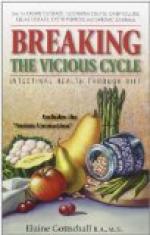[Sidenote: 1 lb. fat 4000 C 1/2 lb. fat 2000 C 1/4 lb. fat 1000 C 1/8 lb. fat 500 C ]
If you want to gain, add gradually 500-1000 Calories per day.
Review
1. Define Calorie, and tell how determined.
2. How many C. in 1 oz. fat? of carbohydrates? of protein?
3. Why are fats so fattening?
4. How many C. per day do you require? do mental workers?
5. Upon what do C. needed per day for normal individuals depend? Discuss.
3
Review and More Definitions
[Sidenote: This Is Dry but Important]
FOOD: That which taken into the body builds and repairs tissue and yields energy in heat and muscular power.
[Sidenote: Approx. %’s if Normal]
CLASSES OF FOOD:
1. Protein, 18% of body weight. 2. Fats, 16% of body weight. 3. Carbohydrates, 1% of body weight. 4. Mineral matter, 5% of body weight. 5. Vitamines. 6. Water, 60% of body weight.
[Sidenote: Nitrogenous Food Compounds]
PROTEIN: Builds tissue, repairs waste, yields energy, and may help store fat. One-half, at least, of your protein should be from the vegetable kingdom.
A large percentage of protein is contained in
Eggs Meat
Fowl Fish Nuts
Milk Cheese
Gluten of Wheat
Legumes (beans, peas,
lentils, peanuts, etc.)
[Sidenote: Protein 113 C. Per Oz.]
There is about one-fourth ounce protein in
1 egg
1 glass milk (skim,
butter, or whole)
1-1/2 oz. lean meat,
or fish or fowl
1 oz. (1-1/5 cu. in.)
whole milk cheese
2 slices of bread, 3-1/2
x 3-1/2 x 1/2
(white,
whole wheat, corn, etc.)
3 heaping tablespoonfuls
canned baked beans or lima beans
17 peanuts
[Sidenote: 255 C. Per Oz.]
FATS: Yield energy and are stored as fat.
Animal Fat: Cream, Butter, Lard
Oils: Cottonseed, Olive Almonds, Peanuts, Walnuts Chocolate, etc.
[Sidenote: 113 C. Per Oz.]
CARBOHYDRATES: Yield energy and are stored as fat.
Sugars (candy, honey, syrup, sweet fruits)
Starches (breads, cereals, potatoes, corn, legumes, nuts)
Vegetable fibre, or cellulose
MINERAL MATTER: Shares in forming bones and teeth, and is necessary for proper functioning.
Carbon Lime Sodium
Potassium,
Sulphur Iron Phosphorus
Etc.
[Sidenote: Whole Grain Products Not Devitalized]
These elements are contained largely in the outer coatings of grains, fruits, and vegetables, and in animal foods and their products. Do not pare potatoes before cooking. Cook vegetables in a small amount of water, saving the water for soups and sauces.




